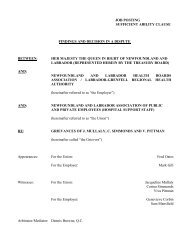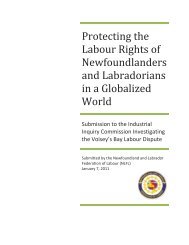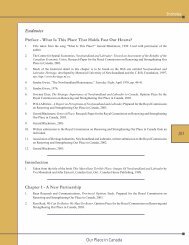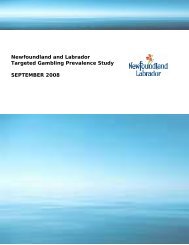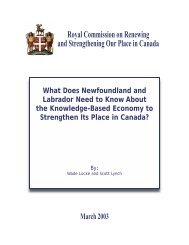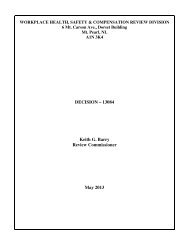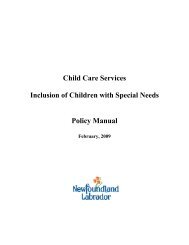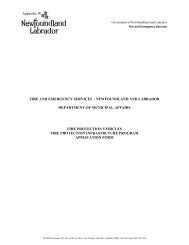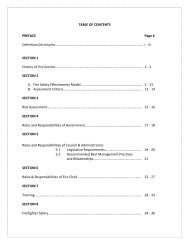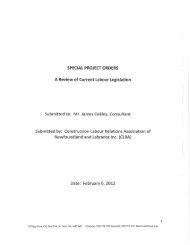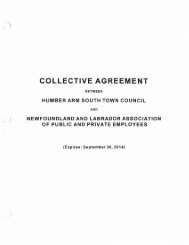Energy Plan - Government of Newfoundland and Labrador
Energy Plan - Government of Newfoundland and Labrador
Energy Plan - Government of Newfoundland and Labrador
You also want an ePaper? Increase the reach of your titles
YUMPU automatically turns print PDFs into web optimized ePapers that Google loves.
Offshore petroleum exploration <strong>and</strong> development activities occur in areas that<br />
have been traditionally the domain <strong>of</strong> the fishery. In inshore waters, such as<br />
Placentia Bay, transshipment <strong>and</strong> refining operations share areas with other users,<br />
including transportation, fishery, other industry, recreational vessels <strong>and</strong> tourism<br />
operations. We recognize the need for cooperation among these users. A good<br />
example <strong>of</strong> such cooperation is One Ocean, a liaison organization established<br />
by the fishing <strong>and</strong> petroleum industries <strong>of</strong> <strong>Newfoundl<strong>and</strong></strong> <strong>and</strong> <strong>Labrador</strong>. Under<br />
the direction <strong>of</strong> a board with representation from both industries, One Ocean<br />
promotes mutual underst<strong>and</strong>ing <strong>and</strong> provides a forum for communication,<br />
information exchange <strong>and</strong> exploring shared opportunities.<br />
In advancing energy development activities, it is important to consider <strong>and</strong><br />
respect the environmental <strong>and</strong> economic interests <strong>of</strong> Aboriginal peoples <strong>and</strong><br />
all <strong>Newfoundl<strong>and</strong></strong>ers <strong>and</strong> <strong>Labrador</strong>ians. Many stakeholders, communities <strong>and</strong><br />
Aboriginal peoples are seeking increased opportunities to provide input into energy<br />
policy <strong>and</strong> resource management. Aboriginal governments <strong>and</strong> organizations<br />
are <strong>and</strong> will be consulted on resource developments in areas subject to l<strong>and</strong><br />
claims or settled treaties. Aboriginal peoples bring their traditional knowledge<br />
to the assessment <strong>of</strong> resource development <strong>and</strong> management, including the<br />
environmental acceptability <strong>of</strong>, <strong>and</strong> impact mitigation for, proposed energy<br />
projects in the province.<br />
<strong>Energy</strong> Efficiency <strong>and</strong> Conservation<br />
Reducing our energy use is the most direct way <strong>of</strong> reducing our energy footprint.<br />
The difference between energy efficiency <strong>and</strong> energy conservation is <strong>of</strong>ten<br />
overlooked, but these are two different approaches. We can be more efficient<br />
in how we use energy <strong>and</strong> we can conserve energy by avoiding its use.<br />
The advantages <strong>of</strong> both energy efficiency <strong>and</strong> conservation are clear: they help<br />
protect our environment – locally <strong>and</strong> globally – by minimizing pollution <strong>and</strong><br />
GHGs. They also decrease energy costs both for individuals <strong>and</strong> businesses,<br />
<strong>and</strong> help us make our resources go farther, benefiting our people today <strong>and</strong><br />
into the future.<br />
Greater energy efficiency combined with conservation measures will lower our<br />
reliance on oil today, thereby reducing the amount <strong>of</strong> emissions released into<br />
the environment. Such measures can also help to ensure we have sufficient<br />
electricity until the completion <strong>of</strong> the Lower Churchill development <strong>and</strong> the<br />
transmission link to the Isl<strong>and</strong>.<br />
POLICY<br />
ACTIONS<br />
L<strong>and</strong>, Water <strong>and</strong> Wildlife<br />
The <strong>Government</strong> <strong>of</strong><br />
<strong>Newfoundl<strong>and</strong></strong> <strong>and</strong> <strong>Labrador</strong> will:<br />
• Ensure that renewable <strong>and</strong><br />
non-renewable resources are<br />
developed in a manner which<br />
both maximizes benefits<br />
for the province while at<br />
the same time protecting<br />
the natural environment,<br />
including our l<strong>and</strong> water <strong>and</strong><br />
wildlife, to the greatest extent<br />
possible.<br />
• Continue to work through the<br />
Council <strong>of</strong> the Federation, the<br />
Council <strong>of</strong> <strong>Energy</strong> Ministers<br />
<strong>and</strong> the Canadian Council <strong>of</strong><br />
Ministers <strong>of</strong> the Environment<br />
to improve the timeliness<br />
<strong>and</strong> certainty <strong>of</strong> regulatory<br />
approval decision-making<br />
processes while maintaining<br />
rigorous protection <strong>of</strong> the<br />
environment <strong>and</strong> public<br />
interest.<br />
• Ensure that stakeholders,<br />
communities, Aboriginal<br />
governments <strong>and</strong> groups are<br />
consulted appropriately on<br />
the development <strong>of</strong> energy<br />
projects.<br />
In addition to protecting <strong>and</strong> preserving our environment, energy efficiency <strong>and</strong><br />
conservation can preserve our incomes <strong>and</strong> protect our economy. Around the<br />
world, rapidly–rising energy prices <strong>and</strong> shortages in many areas have made<br />
conservation <strong>and</strong> energy efficiency necessary parts <strong>of</strong> doing business. For<br />
industry, more efficiency means a more competitive economic environment.<br />
57



